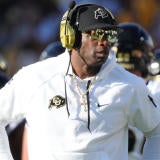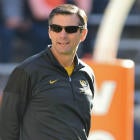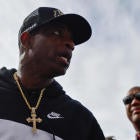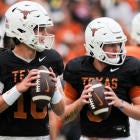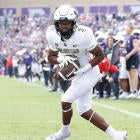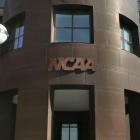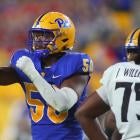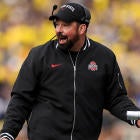
Increasingly, the NCAA and Division I conferences have given athletes more of a voice in helping make decisions for college sports. These athletes are able to vote on some NCAA rules, and some conferences are allowing them to vote on league rules, too. Athletes recently conducted an extensive survey on time demands, and they have been given a seat at the table with administrators to discuss issues as external threats continue to challenge the NCAA.
Last week produced a rare but increasingly common sight: Five current or recent SEC athletes participated in the conference's spring meetings. Some of them have player votes in NCAA autonomy for the SEC. The athletes come from different sports and with different ideas so their opinions don't necessarily represent the majority of players' thoughts.
Still, since these athletes provide direct feedback to the people running college sports, I thought it would be informative to hear directly from the players.
What's on their mind? Below are excerpts from interviews with four of the athletes.
Ex-Mississippi State football player Jay Hughes:Started 12 games at safety and was a team captain in 2014, his final season, when Mississippi State rose to No. 1 in the country. Currently a graduate assistant at Jackson State where is dad, Tony Hughes, is head coach.
Ole Miss baseball player Brady Bramlett: Ranked 14th in ERA in the SEC during 2016. Expected to get selected this week in the Major League Baseball draft after going in the 22nd round last year.
Texas A&M swimmer Antoine Marc: Ranks on the Aggies' all-time top 10 list in the 200 freestyle and the 200 and 400 individual medley. Texas A&M's 2016 nominee for SEC male scholar athlete of the year is currently applying to medical school.
Tennessee women's basketball player Diamond DeShields: Named 2014 national freshman of the year at North Carolina before transferring to Tennessee, where she was second-team All-SEC in 2016. Daughter of former pro baseball player Delino DeShields and brother of Delino DeShields Jr., who has recently played for the Texas Rangers.
What do you view as the biggest issue for college athletes?
Hughes: "I see a lot of guys who don't have the opportunities that they need to go out and look for jobs or develop themselves for a career besides just being an athlete. I had teammates who didn't even know how to fill out a checking deposit slip at the bank. ... First of all, they have to pick a major they're actually interested in. Some guys just pick a major because it's easy. When they get done playing, they have this degree sitting there and they can't do anything with it.
"I take myself, as an example. I went to Mississippi State, which is a big engineering school. I wanted to be an electrical engineer so I could help my grandfather out with his radio station. I felt like I wouldn't have the right amount of time to study. I ended up majoring in history. I don't really have many regrets. I love history, but there's really not a whole lot you can do with history."
Bramlett: "I think the biggest hurdle we have right now is mistrust from top to bottom. That's something we have to work on where upper-level administrators are communicating with student-athletes and letting them know what are the issues and how they impact your welfare. But it comes back to us that we have to be advocates of our own cause and let people know we're old enough and mature enough to understand what the issues are and voice how they impact us. We have to be unified in our voice. We have to have the responsibility that now we have this voice and we have to use this in the right way. The worst thing that could happen is have frustration exhibited."
Marc: "A lot of hot-topic issues that the media decides to cover, like should student-athletes get paid, honestly isn't a hot topic issue for student-athletes. The majority of us aren't the superstar football or basketball players, so for us, I think it's the opportunity to gain summer internships, winter internships or gain valuable work experience outside the competition season so we're better prepared when our athletic careers are over. A lot of us feel like we're struggling to be able to find that time to take control of our opportunities."
DeShields: "Paying players is the pink elephant in the room and a lot of people [within college sports] just don't want to talk about it. But you can turn on the TV and watch an NBA game and that's what the commentators are talking about. It's definitely relevant. There are a lot of different opinions on it. Although maybe some [athletic directors] and [faculty athletic representatives] may not want to hear about it, I think listening to the opinions of everyone else could help attack the subject and address it."
Should college athletes be allowed to make money?
Hughes: "I want to say yes. It's hard, man. It's tough because some guys don't know how to manage their money; they've never had money and then they put their money in the wrong places. I would love to have had the money. I was always big on saving money, so I would have tried to make some investments. I think eventually it will happen. It's a tough deal to even talk about because it's never happened.
"[College administrators] are saying you take away from the amateurism of the sport. If football is bringing in all the money and you're paying those players, then what about the swimmers or the softball players or all these other people involved in athletics? ... Maybe a good idea, and this is just me talking, would be if football is bringing in the money, then the money goes to football. If basketball is bringing in more money than football at Kentucky, then basketball gets the money it brings in. If the track team at Florida is bringing in money, then they get that money."
Bramlett: "If it comes to the point where student-athletes are paid, I will step away from the association because that's when you lose the beauty of college sports. The beauty of it is it's an incredible opportunity because you're student-athletes, and the main word being student. It's a billion-dollar industry, and granted these are million-dollar salaries and multi-million dollar facilities, but that's directly benefiting the student-athletes.
"Now granted, not a lot of people have the same viewpoint as I do. That's something we have to work on with the association is the branding. ... I want to pursue athletic administration. I'd love to be an athletic director. My ultimate goal is to one day be commissioner of the SEC. Commissioner Greg Sankey is a fantastic advocate for college athletics. We have an ongoing joke. He just says, 'Let me stay in office a little longer.'"
Marc: "Maybe not because it changes the whole system. Just because a select few can [make money] doesn't mean they should. I'm a swimmer. One of my worries is what happens to Olympic sports? Would my sport have to be cut if another football player was able to receive payments just because they wanted to focus more on those sports?
"Don't get me wrong, if all student-athletes could get paid, that's great for us. I don't think it's a well-thought out idea yet. I don't think it's the proper time as of yet because then what happens if you have to take more time out of class to market yourself? You're given the opportunity to market yourself and your program and then you -- not go behind their back -- but you decide to have more selfish attributes just for you to gain money instead of waiting two years. At the same time, if you get injured, you lose money. I understand that."
DeShields: "I believe they should. Now with that being said, obviously not like here's a check for thousands of dollars. But maybe put it in some trust fund, something just to say, 'Hey, thank you for being here.' ... I've done research on this topic and looked at the numbers the star quarterback or the star point guard for some of these teams are making for the university, and they're not seeing a penny of it in the name of amateurism. I don't believe that's fair. ...
"I'm not saying I deserve thousands of dollars. But a guy like Ben Simmons or Jameis Winston? Those guys deserve what they've worked hard for. If you could put me, for example, on a commercial and have it air in Knoxville -- 'Hey, come out to the game tonight' -- it's the same as me tweeting a video saying that. With the increase of social media and the access people have to student-athletes, it's even hard to just do community service now. You have to run it by compliance. I'm like, 'I'm doing it for free, what's the issue?'"
Do college athletes need more time off and, if so, how do you do it?
Hughes: "Greg Sankey was saying a couple of Big Ten guys were saying, 'I've never had a day off and played football at Minnesota.' How do we fix that? I'm coming from Mississippi State and saying, 'Hey, we did have days off. We did have down time.' I don't know if it really affected football. When you're in-season, you can't really stress a whole lot. I can really understand time demand is a very big issue if you're out of season. With some sports, they never go out of season."
Bramlett: "Personally, I believe everything that is currently counted [by the NCAA for a rule allowing 20 hours per week of countable athletically required activities] should remain the same. But then again, there's a lot of athletes that feel differently about it. There's no student-athlete in the SEC playing a sport who didn't know there would be an extreme amount of time spent on their sport. What it is is liberty of our free time so coaches say, 'You'll have practices from X time to another time' and we can plan for other parts of our day. Make sure coaches stick to that plan and you don't have any instances where coaches say within 30 minutes, 'Be at the building at this time.'"
Marc: "I think it's important to have that conversation with your coaches and your athletic directors that you need work experience and for them to understand it's really important to get ready for your next chapter in life. I was very fortunate my coach let me shadow the doctors I wanted to shadow and take the courses I needed to take. That doesn't always happen. ...
"For the 20-hour rule, if you travel on a certain day and can't count that as a regular day and the next day is an off day, you can't train so you miss two days off in a week. That's an issue with coaches and athletes. How are we prepared for the upcoming match and have enough time to recover and do school work? That's a really tough question because I know when I was traveling -- and it's the case for a lot of athletes -- we have to work on the plane or the bus where sometimes it's not the best situation because the WiFi cuts out all the time. How can you get everything done?"
DeShields: "I'm spending more than 30 hours a week out of season right now -- physical therapy, speed and agility, individual workouts. You're just trying to get better. I'm doing a lot in the offseason and that's totally up to me because I want to be an elite-level athlete. One day off a week may be a great, great thing for football players, but they play once a week. In basketball, you're playing a couple games a week and it's hard to really, really not use those travel days as a day off. ...
"I believe that all coaches, no matter what level you're on, believe in toughness. So as a player, for us to have a platform on what's never been spoken on, some coaches could possibly view us as being weak or complaining about the time. And in some cases, that is true. Some of the student-athletes do complain about a lot of things and most of the coaches are always bound by a lot of these rules for time. I can see why the coaches feel more rules will just complicate things."
Athletes now have votes for NCAA autonomy and in some conferences, such as the Pac-12. Should SEC athletes get to vote in the conference on SEC issues?
Hughes: "I went to the NCAA convention in DC and San Antonio. They gave me a vote in San Antonio, which was after I got done playing. I was included in a straw poll in Destin [at the SEC Spring Meetings]. I think I had a good voice."
Bramlett: "We're in the process of working on that. We don't have a direct vote within the conference, but we're in the room when there's conference legislation being proposed. We were being asked our opinion on how it affects us. That didn't happen three years ago. This is awesome."
Marc: "I think it's important to have a vote. But I do think they take our considerations to heart because we're able to be part of a straw poll before a vote happens, and most of them do take that into consideration. They come up and talk to us afterward and say, 'I didn't know that was a need for this particular issue.' I feel like especially with commissioner Greg Sankey being in charge, the student-athletes finally have a large voice and can really have an impact. The air feels different within our athletic department. We're able to speak our minds on certain issues knowing we won't be looked at in a different light if you can say it in a proper way to the right person."
DeShields: "Probably so. We're getting a pretty good voice and I'm learning new things. ... It was interesting hearing [SEC administrators] talk about when a recruit's ACT or SAT score increases, at what level do they flag it? All of us [SEC athletes in the room] were curious and we're like, 'How many cases do you deal with this in a year for this to be talked about in this detail?' They said there's about five cases per university and one each gets taken back to the SAT/ACT people for a second look. In my mind, it's not a lot. But there's this line, and then there's a definitive yes and a definitive no and there's this small gray area.
"It's just interesting to hear things like this. Fraud is something that happens a lot. I think about my own ACT. When I took my ACT, it was like air tight in there. You couldn't cheat. I don't even know how people cheat on their ACTs. So it's really getting outside my own experiences and seeing, 'Hey, these things really do happen,' and then trying to choose a side to stand for."









